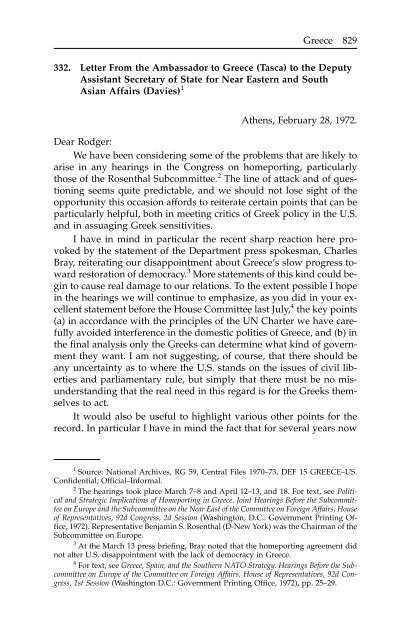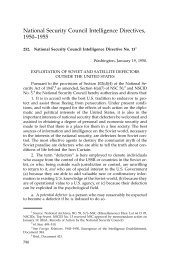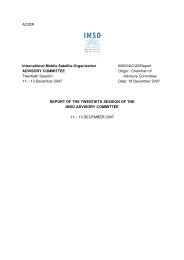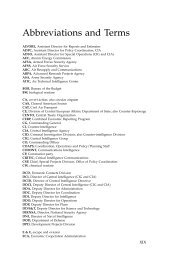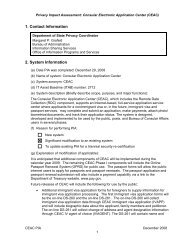Greece - US Department of State
Greece - US Department of State
Greece - US Department of State
Create successful ePaper yourself
Turn your PDF publications into a flip-book with our unique Google optimized e-Paper software.
<strong>Greece</strong> 829<br />
332. Letter From the Ambassador to <strong>Greece</strong> (Tasca) to the Deputy<br />
Assistant Secretary <strong>of</strong> <strong>State</strong> for Near Eastern and South<br />
Asian Affairs (Davies) 1<br />
Athens, February 28, 1972.<br />
Dear Rodger:<br />
We have been considering some <strong>of</strong> the problems that are likely to<br />
arise in any hearings in the Congress on homeporting, particularly<br />
those <strong>of</strong> the Rosenthal Subcommittee. 2 The line <strong>of</strong> attack and <strong>of</strong> questioning<br />
seems quite predictable, and we should not lose sight <strong>of</strong> the<br />
opportunity this occasion affords to reiterate certain points that can be<br />
particularly helpful, both in meeting critics <strong>of</strong> Greek policy in the U.S.<br />
and in assuaging Greek sensitivities.<br />
I have in mind in particular the recent sharp reaction here provoked<br />
by the statement <strong>of</strong> the <strong>Department</strong> press spokesman, Charles<br />
Bray, reiterating our disappointment about <strong>Greece</strong>’s slow progress toward<br />
restoration <strong>of</strong> democracy. 3 More statements <strong>of</strong> this kind could begin<br />
to cause real damage to our relations. To the extent possible I hope<br />
in the hearings we will continue to emphasize, as you did in your excellent<br />
statement before the House Committee last July, 4 the key points<br />
(a) in accordance with the principles <strong>of</strong> the UN Charter we have carefully<br />
avoided interference in the domestic politics <strong>of</strong> <strong>Greece</strong>, and (b) in<br />
the final analysis only the Greeks can determine what kind <strong>of</strong> government<br />
they want. I am not suggesting, <strong>of</strong> course, that there should be<br />
any uncertainty as to where the U.S. stands on the issues <strong>of</strong> civil liberties<br />
and parliamentary rule, but simply that there must be no misunderstanding<br />
that the real need in this regard is for the Greeks themselves<br />
to act.<br />
It would also be useful to highlight various other points for the<br />
record. In particular I have in mind the fact that for several years now<br />
1<br />
Source: National Archives, RG 59, Central Files 1970–73, DEF 15 GREECE–<strong>US</strong>.<br />
Confidential; Official–Informal.<br />
2<br />
The hearings took place March 7–8 and April 12–13, and 18. For text, see Political<br />
and Strategic Implications <strong>of</strong> Homeporting in <strong>Greece</strong>. Joint Hearings Before the Subcommittee<br />
on Europe and the Subcommittee on the Near East <strong>of</strong> the Committee on Foreign Affairs, House<br />
<strong>of</strong> Representatives, 92d Congress, 2d Session (Washington, D.C.: Government Printing Office,<br />
1972). Representative Benjamin S. Rosenthal (D-New York) was the Chairman <strong>of</strong> the<br />
Subcommittee on Europe.<br />
3<br />
At the March 13 press briefing, Bray noted that the homeporting agreement did<br />
not alter U.S. disappointment with the lack <strong>of</strong> democracy in <strong>Greece</strong>.<br />
4<br />
For text, see <strong>Greece</strong>, Spain, and the Southern NATO Strategy. Hearings Before the Subcommittee<br />
on Europe <strong>of</strong> the Committee on Foreign Affairs, House <strong>of</strong> Representatives, 92d Congress,<br />
1st Session (Washington D.C.: Government Printing Office, 1972), pp. 25–29.


